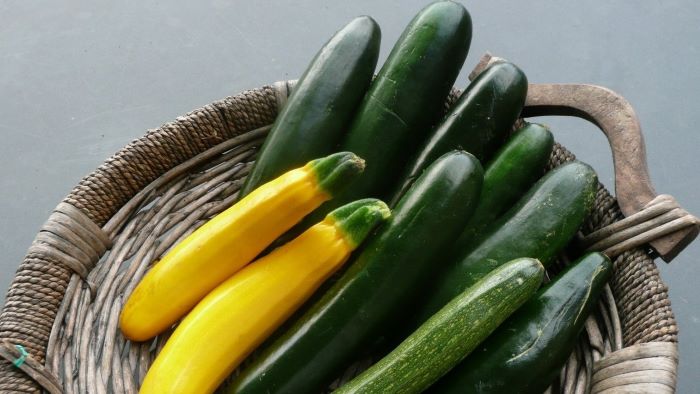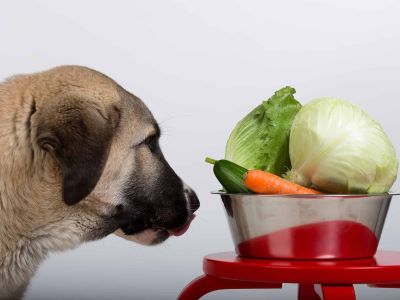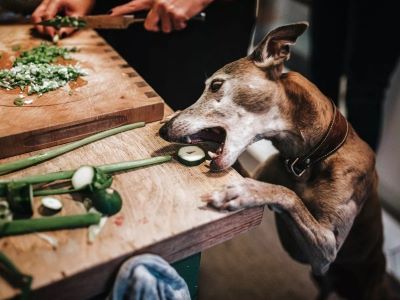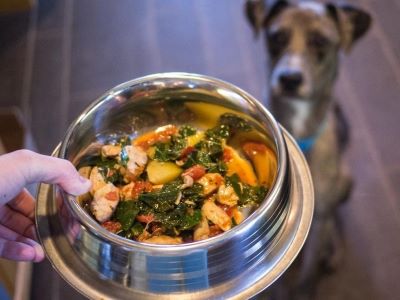It is a common question for every dog parent out there if Courgette is a good source of nutrients for their pets. And if your dog likes flowers, will eating its flowers cause your dog stomach issues? It is a delicious vegetable for humans to have, but can dogs digest it? This article will answer your questions about “Can Dogs Eat Courgette?” or Zucchini.
Doggies usually enjoy having their veggies and adding a unique addition to your dog’s diet now and then is a perfect way to keep them satisfied and a little variety to their diet. Courgettes can be introduced as treats for pets that don’t like veggies.

What are Courgettes?
Courgettes are an increasingly popular summer squash that has their origins in North America. Of course, they’re perhaps better known as zucchini. Interestingly though (to some of us anyway), the zucchini that Americans eat today is a cultivar of the original North American squash.
It was cultivated in Tuscany in northern Italy in the second half of the 19th century and then exported back to America by Italian immigrants in the early 1920s. Now not a lot of Americans know that. But the question that arises here is “Can Dogs Eat Courgette?”
Can Dogs Eat Raw Courgette?
Humans can eat courgettes as it contains a lot of vitamins, minerals, and nutrients. But can your pet even eat courgettes raw and enjoy the nutritional benefits? Yes, raw courgettes are safe and healthy for dogs to eat. The crunchiness of a fresh raw courgette even helps clean your dog’s teeth as they chew.

Courgettes are best eaten raw. It is supposed to be an addition to our salads because of the roughage and fibres of the vegetables. If your dog loves veggies, it would be delighted to eat the courgettes raw.
“This summer squash contains numerous vitamins, including A, C, and K. It’s also rich in potassium and magnesium, all of which can help support your dog’s overall health”, says April Saylor from PetMD. “And if your dog needs to shed a few pounds, adding zucchini to their food bowl may be a way to help them lose weight while still filling up.“
Make sure you wash the vegetables with fresh water and chop them into eatable sizes for the dog. The best way would be to mix it in their dog food, as it would not taste any different than what it currently eats as its daily diet.
Can Dogs Eat Cooked Courgette?
Raw courgettes are safe for dogs, but can you also feed your dog cooked courgettes? The answer is yes, dogs can eat cooked courgettes without any issues. Cooking the courgettes softens them up which makes them easier to chew and digest for some dogs.
The best cooking methods to use for making dog-friendly courgettes are steaming, boiling, or baking. Avoid frying the courgettes in oil or seasoning them heavily with spices. Plain, lightly cooked courgettes are the way to go. Just let the cooked courgettes cool down completely before serving them to your dog to prevent burns.

So feel free to some healthy cooked courgettes into your dog’s diet or use them as nutritious mix-ins for homemade dog food recipes. Both you and your dog can enjoy the benefits of cooked courgette treats!
How to Serve Courgettes to Dogs
You can let your dog have a small bite of courgette at first so that you can decide its portion sizes. A few thin slices or chopped cubes equaling about 10-15% of their total daily food is a good starting amount. Adjust portions up or down based on their appetite and digestive tolerance.
When introducing courgettes, go slowly at first. You can try mixing a few bites of courgette into their regular dog food. Later, monitor it for any signs of digestive upset like vomiting or diarrhoea so that you can take proper care and precautions for the next time. If it can tolerate it well, you can gradually increase the amount over a week or two. This gives their system time to adjust to the new food.

You can also puree the courgettes and mix them into homemade dog food recipes. Or save courgette scraps after cooking and add them to their kibble or wet food for extra nutrition and flavour. With some simple preparation and transition time, courgettes can be a tasty dietary addition for your dog!
Potential Side Effects of Eating Courgettes
Courgettes are generally very safe for dogs to eat. However, some may experience mild digestive upsets or allergies after eating them.
Signs of intolerance can include diarrhoea[1], vomiting, and gas after consuming courgettes. These side effects should pass quickly if you stop feeding courgettes. For persistent or severe symptoms, discontinue feeding courgettes and contact your veterinarian, as your dog may have a courgette allergy.
It’s important not to suddenly give your dog a large amount of courgettes if they aren’t used to digest high-fiber foods. Introduce courgettes slowly and in moderation. Also be sure to remove all seeds, which could potentially cause intestinal blockages if consumed.
Usually, any negative side effects of courgettes are temporary and affect only a small portion of dogs. But if you notice consistent issues after feeding courgettes, try substituting for lower-fiber alternatives. Overall though, most dogs can enjoy zucchini in moderation with no problems!
Courgette-Loving Dogs
Certain breeds of dogs tend to enjoy fruits and vegetables more than others. For example, retrieves, poodles, German shepherds, and Labradors often relish veggie treats like courgettes. Their omnivorous ancestral history makes them more open to plant foods.
Smaller dogs may have trouble digesting[2] the fibre in raw courgettes, so cooked or pureed is best for them. Monitor all dogs closely for food intolerances.
To encourage picky eaters to try courgettes, chop them small or shred them and mix them into meat mixtures. Lightly roasted courgettes to maximize their nutritional benefits for your dog.
So the next time you’re prepping courgettes for yourself, go ahead and set some small pieces aside for your pet. Both of you can enjoy the tasty versatility of vitamin-rich courgettes!
FAQs
Can Dogs Eat Courgette?
Yes, courgettes are a healthy vegetable for dogs to eat in moderation. They contain beneficial vitamins, minerals, and fibre. Both raw and cooked courgettes can be fed to dogs as an occasional treat or meal addition.
How much courgette should I feed my dog?
When first introducing courgettes, start with just a few thin slices or chopped cubers equalling 10-15% of their daily food. Monitor their digestion and increase slowly over 1-2 weeks. Adjust portions as needed based on your dog’s size and appetite.
What if my dog has diarrhoea or vomiting after eating courgettes?
Stop feeding courgettes immediately if your dog has digestive upset. The fibre may be too much for their stomach. Once symptoms resolve, try reintroducing very small amounts of courgette mixed in their food and increase slowly. Consult your vet if symptoms persist.
Can I give my dog courgette skins and seeds?
It’s best to remove and discard the skins and seeds first, as they are hard to digest and can potentially cause intestinal blockages if consumed. Chop or grate the courgette flesh before serving to your dog without skins or seeds.
How can I get my picky dog to eat courgettes?
Mix shredded courgette into meat mixtures, serve roasted courgette slices as crunchy treats, or puree and add to their food. Start with small amounts and offer praise and pets when they eat courgettes to positively reinforce the behaviour.
Conclusion
Courgettes are a healthy and delicious vegetable that happens to be perfectly safe for dogs to eat as well. Both raw and cooked courgettes can be fed to dogs in moderation as treats or additions to their regular diet. Just be sure to introduce new foods slowly, and monitor gastrointestinal upset is possible if dogs consume too much courgette fibre too quickly. But most dogs can enjoy small amounts with no problems.
Feeding your dog fresh fruits and veggies like courgettes gives them nutritional variety in their diet. It also gives them the joy of sharing a tasty snack with their human. So go ahead and share some chopped-up raw courgettes or save your leftover cooked can be a healthy dietary supplement to enhance your dog’s nutrition and happiness.
References:
- Cross, B. (n.d.). Diarrhoea in dogs. Blue Cross.
- Introduction to digestive disorders of dogs. MSD Veterinary Manual.



